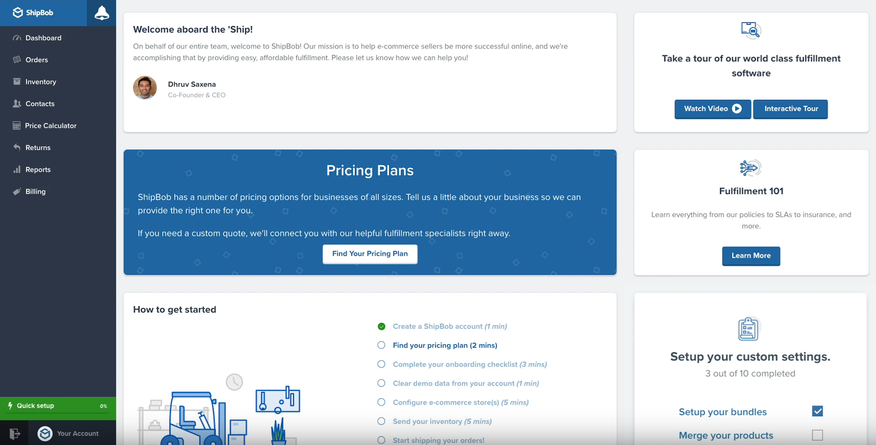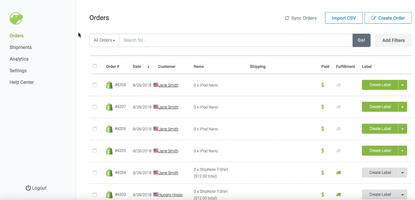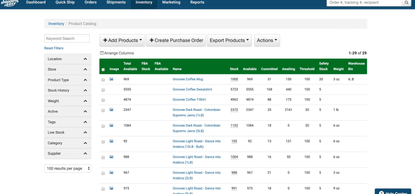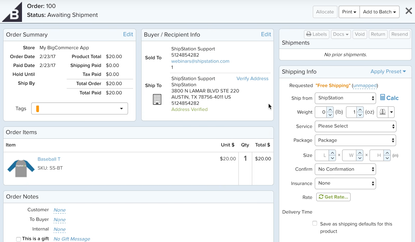ShipBob Review: Features, Pros and Cons
While ShipBob might not work for those seeking a basic order management tool or for local businesses with no expansion plans, it impresses with its proficiency in eCommerce order fulfillment. With its platform flexibility and focus on efficient shipping logistics, it’s clear this software is designed with global-scale operations in mind.
Real-time inventory tracking promotes smoother operations and brings a level of transparency that’s commendable. However, its international fulfillment options might be overkill for businesses with more localized aims.

- Integrates with major eCommerce platforms
- International fulfillment services
- Facilitates batch order management
- No color size matrix for apparel inventory
- Complex pricing model
- Needs monthly minimum shipment threshold
- Developer ShipBob
- Client OS Web
- Deployment Cloud Hosted
What is ShipBob?
ShipBob is an integrated order fulfillment software platform that couples a software solution with an order fulfillment service designed to streamline eCommerce operations. A simple way to explain it is that you send ShipBob your inventory, which they store and ship for you once you get an order.
Its software interfaces with major eCommerce platforms, enabling businesses to manage orders and track inventory in real time. Concurrently, its fulfillment service facilitates the packing and shipping of orders, utilizing a distributed inventory model to shorten transit times and manage shipping costs.
Additionally, it offers international fulfillment, allowing businesses to reach global customers. However, ShipBob requires businesses to meet a certain volume of shipments and has specific inventory tracking guidelines for apparel due to the high number of SKUs involved.
Who is ShipBob For?
ShipBob caters to a broad range of businesses, from small to medium-sized eCommerce entities looking to expand their operations. Its core customer base predominantly comprises smaller companies with less than 50 employees, emphasizing its capacity to nurture and cater to businesses in their growth phase.
The platform is also adept at serving businesses with varying revenue sizes. Clients generating yearly revenues between $0M-$5M find ShipBob’s services valuable, as do larger clients with revenue between $5M-$300M. This flexibility in serving businesses of different scales underlines ShipBob’s comprehensive approach toward eCommerce fulfillment.
Moreover, ShipBob services an array of industries without limitations. However, they have specific preferences for clothing and soft goods businesses. Due to the large number of SKUs these industries typically handle, ShipBob prefers that such customers adhere to specific inventory tracking procedures.
The platform offers real-time inventory tracking and robust integrations with other eCommerce platforms like Shopify, WooCommerce, and Amazon. Its reliable international fulfillment services further make it a valuable tool for businesses looking to streamline logistics and grow without the complexities of in-house operations.
Our Ratings
| Usability - 10 | Great shipping and fulfillment speeds; easy order management; straight-forward inventory distribution; visibility into shipping weights |
| Support - 8 | Account Manager available for setup and implementation; help center includes walkthrough guides for a variety of topics; release notes are available; contact information (phone or email) difficult to locate on website but there is a chat feature built into software itself. |
| Scalability - 8.5 | Specifically targets growing eCommerce business owners; ideal customer is mid-market with a growth mindset; not ideal for small stagnant company not looking to boost orders. |
| Security - 10 | Has data security policy in place to limit access of personal data to only personnel who need to know; ensure third parties they operate with operate under similar measures; |
| Value - 8 | Great value for 3PL services; apt shipping and fulfillment speeds for cost paid; does have a handful of fees to consider when shipping and receiving. |
| Performance - 10 | Software runs seamlessly between modules; users report great shipping and fulfillment speeds. |
| Key Features - 8.5 | Streamlined order management; inventory distribution is straightforward; easily displays shipping weights and visibility; B2B shipping not as big of a focus as DTC. |
Integration with eCommerce Platforms
ShipBob integrates with many leading eCommerce platforms, such as:
- Shopify
- WooCommerce
- Amazon
- BigCommerce
- eBay
- Magento
- Squarespace
- Square
- Walmart
- Temu
Real-Time Inventory Management
ShipBob’s real-time inventory management feature allows businesses to track their inventory levels in real time, giving them the insights needed to make informed decisions about stock replenishment, sales forecasting, and order fulfillment. Having this level of visibility and control can prevent stock-outs and overstock situations, thereby improving sales performance and customer satisfaction.
International Fulfillment
The platform’s expansive global network allows businesses to ship their products to customers all around the world. They have recently expanded their global locations in 2025, so you can fulfill in-country or ship internationally to 250+ destinations, including the UK, EU, Australia, Canada, and the US. This feature is particularly advantageous for businesses looking to expand their global customer base, as it eliminates the complexities and costs of international shipping and logistics.
Distributed Inventory
This involves storing products in different fulfillment centers across the country to allow for faster and more cost-effective shipping. This strategic distribution can reduce transit times, decrease shipping costs, and ultimately improve the overall customer experience.
What Features Are Missing?
- Business-to-business (B2B) service may not be as tested as direct-to-consumer (DTC): We’ve found user reviews on the web that indicate the DTC service is excellent but the B2B service has faced issues. The customer support has been fantastic but some users wish their B2B service was on par with DTC.
- Complex pricing model: It’s not terribly complex for a 3PL, but for someone ShipBob to be a flat monthly fee depending on how many orders they deal with, they may be surprised at the fees involved with both the fulfillment and receiving process.
Pricing Plans
Pricing for ShipBob involves both fixed and variable components. A business will determine how much their ShipBob costs will be depending on their pick and pack fees and weight-based shipping fees. There is a potential for additional fees depending on the services used.
NOTE: This is ShipBob’s previous pricing model, as they have now gone to a quote-based model. However, these prices are still around what you can expect to see.
| Type of Cost | How It's Billed | Details |
Fulfillment Cost
|
|
|
| Storage | Monthly Charge | $40 per pallet/month, $10 per shelf/month, $5 per bin/month |
| Receiving | Per Warehouse Receiving Order | $35 for the first two hours ($45/man hour after the first two hours) |
| Additional Services | Specific to the order | Kitting, B2B, large orders (>25 items), returns, surcharges, etc. |
What Companies Use ShipBob?
Here are some case studies provided by ShipBob that detail different companies that have saved using ShipBob:
You can read more case studies on ShipBob’s blog.
What Items Are Prohibited on ShipBob?
According to the acceptable products and use policy of ShipBob, restricted items that they will not accept in their warehouse or handle the fulfillment of include products that are, or appear to be, restricted by law or regulation, including products that require specific licenses to store or distribute, including, but not limited to, live plants and animals, alcoholic beverages, prescription pharmaceuticals, ammunition and firearms, tobacco, and explosives.
Alternatives



Summary
ShipBob stands as a compelling solution for eCommerce businesses desiring streamlined order fulfillment. With integrations to leading platforms, real-time inventory tracking, and international fulfillment, it simplifies shipping logistics.
However, it may be less beneficial for predominantly local businesses or those not heavily reliant on eCommerce platforms. Its target market spans small to medium-sized companies, especially those in the apparel industry. Some limitations include a required minimum shipment volume and a complex, fee-laden pricing model.
ShipBob offers substantial value, but its suitability will depend on an organization’s unique requirements and context.
User Reviews of ShipBob
No reviews have been submitted. Do you use ShipBob? Have you considered it as part of your software evaluation process? Share your perspective by writing a review, and help other organizations like yours make smarter, more informed software selection decisions!

